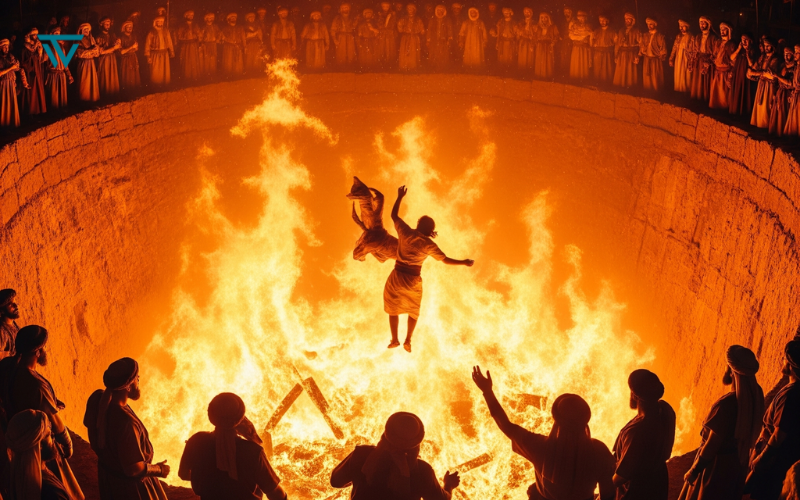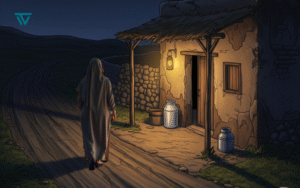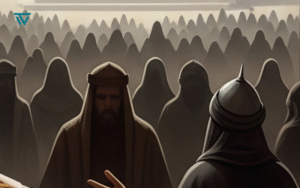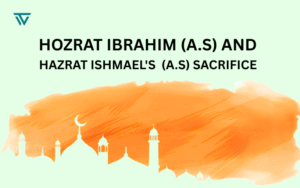The Trial of Prophet Ibrahim (AS) and Nimrod’s Rage

0 people are currently reading this article
Prophet Ibrahim (Abraham), peace be upon him (AS), holds an incredibly significant position in Islam, revered as “Khalilullah” (the Friend of Allah). His profound narrative resonates across the three major Abrahamic faiths: Judaism, Christianity, and Islam. His life story is a powerful testament to unwavering faith, complete submission to God, and profound sacrifice. Among his many challenges, The Trial of Prophet Ibrahim stands out as a testament to his unwavering conviction.
Prophet Ibrahim’s Early Life: The Quest for Truth and Rejection of Idolatry
Prophet Ibrahim (AS) was born in the ancient city of Ur, a prominent center of the Mesopotamian civilization in present-day Iraq. At that time, his community was deeply entrenched in idol worship. The worship of man-made idols was so ingrained in their society that it formed the very foundation of their religious practices. Interestingly, Prophet Ibrahim’s father, Azar, was a renowned idol sculptor and merchant, with the family home often serving as a hub for the trade of deities and statues.
Ibrahim’s Profound Contemplation of Creation
However, unlike other children of his time, Ibrahim (AS) never blindly accepted these prevailing beliefs. From a young age, a deep sense of inquiry stirred within him. He would intensely contemplate the moon, sun, stars, and the mysteries of the Earth’s creation. When he observed the shining moon in the night sky, he would ponder, “Perhaps this is my Lord!” Yet, as dawn broke and the moon disappeared, he realized it couldn’t be eternal. Similarly, when he saw the vast sun at noon, he thought, “This might be the greatest, this is surely my Lord!” But as evening approached and the sun set, he declared, “No, this cannot be my Lord. If my Lord leaves me, how can He be my sustainer?” (This narrative is beautifully described in Surah Al-An’am, 6:75-78, illustrating Prophet Ibrahim’s quest for truth):
كَمَا أَرَيْنَا إِبْرَاهِيمَ مَلَكُوتَ السَّمَاوَاتِ وَالْأَرْضِ وَلِيَكُونَ مِنَ الْمُوقِنِينَ فَلَمَّا جَنَّ عَلَيْهِ اللَّيْلُ رَأَىٰ كَوْكَبًا ۖ قَالَ هَٰذَا رَبِّي ۖ فَلَمَّا أَفَلَ قَالَ لَا أُحِبُّ الْآفِلِينَ فَلَمَّا رَأَى الْقَمَرَ بَازِغًا قَالَ هَٰذَا رَبِّي ۖ فَلَمَّا أَفَلَ قَالَ لَئِن لَّمْ يَهْدِنِي رَبِّي لَأَكُونَنَّ مِنَ الْقَوْمِ الضَّالِّينَ فَلَمَّا رَأَى الشَّمْسَ بَازِغَةً قَالَ هَٰذَا رَبِّي هَٰذَا أَكْبَرُ ۖ فَلَمَّا أَفَلَتْ قَالَ يَا قَوْمِ إِنِّي بَرِيءٌ مِّمَّا تُشْرِكُونَ
“[And thus] did We show Abraham the dominion of the heavens and the earth that he might be of those who have certainty [in faith].” “So when the night covered him with darkness, he saw a star. He said, ‘This is my Lord.’ But when it set, he said, ‘I do not like those that disappear.'” “And when he saw the moon rising, he said, ‘This is my Lord.’ But when it set, ‘Unless my Lord guides me, I will surely be among the misguided people.'” “And when he saw the sun rising, he said, ‘This is my Lord; this is greater.’ But when it set, he said, ‘O my people, indeed I am free from what you associate with Allah.'”
[Surah Al-An’am, 6:75-78]
Through such profound observations of nature’s ever-changing phenomena, he realized that something which itself changes or disappears cannot be an eternal Creator. His deep introspection led him to the undeniable conclusion that behind this vast and perfectly ordered universe, there must be an invisible, infinitely powerful, and eternal Creator who controls everything. This spontaneous realization guided him towards the Oneness of Allah (Tawhid).
Challenging Idolatry and Calling to One God
As Ibrahim (AS) entered his youth, this conviction grew even stronger. He began to challenge the prevailing idol worship of his community. Repeatedly, he tried to explain to his family and people that these idols were mere inanimate objects. They could neither benefit nor harm anyone, nor could they even protect themselves. He argued that what they worshipped as gods were nothing more than pieces of stone carved by their own hands. Such worship, he emphasized, was utterly baseless and futile. He called them to the worship of One God, who created and controls everything. (This appeal is highlighted in various Quranic verses, such as Surah Maryam, 19:42-45, and Surah Al-Anbiya, 21:52-54):
إِذْ قَالَ لِأَبِيهِ يَا أَبَتِ لِمَ تَعْبُدُ مَا لَا يَسْمَعُ وَلَا يُبْصِرُ وَلَا يُغْنِي عَنكَ شَيْئًا يَا أَبَتِ إِنِّي قَدْ جَاءَنِي مِنَ الْعِلْمِ مَا لَمْ يَأْتِكَ فَاتَّبِعْنِي أَهْدِكَ صِرَاطًا سَوِيًّا يَا أَبَتِ لَا تَعْبُدِ الشَّيْطَانَ ۖ إِنَّ الشَّيْطَانَ كَانَ لِلرَّحْمَٰنِ عَصِيًّا يَا أَبَتِ إِنِّي أَخَافُ أَن يَمَسَّكَ عَذَابٌ مِّنَ الرَّحْمَٰنِ فَتَكُونَ لِلشَّيْطَانِ وَلِيًّا
“When he said to his father, ‘O my father, why do you worship that which does not hear and does not see and does not avail you in anything?'” “O my father, indeed there has come to me of knowledge that which has not come to you, so follow me; I will guide you to an even path.” “O my father, do not worship Satan. Indeed, Satan has ever been a rebel against the Most Merciful.” “O my father, indeed I fear that there will touch you a punishment from the Most Merciful so you would be to Satan a companion [in Hellfire].”
[Surah Maryam, 19:42-45]
وَلَقَدْ آتَيْنَا إِبْرَاهِيمَ رُشْدَهُ مِن قَبْلُ وَكُنَّا بِهِ عَالِمِينَ إِذْ قَالَ لِأَبِيهِ وَقَوْمِهِ مَا هَٰذِهِ التَّمَاثِيلُ الَّتِي أَنتُمْ لَهَا عَاكِفُونَ قَالُوا وَجَدْنَا آبَاءَنَا لَهَا عَابِدِينَ قَالَ لَقَدْ كُنتُمْ أَنتُمْ وَآبَاؤُكُمْ فِي ضَلَالٍ مُّبِينٍ
“And We had certainly given Abraham his sound judgment before, and We were of him All-Knowing.” “When he said to his father and his people, ‘What are these statues to which you are devoted?'” “They said, ‘We found our fathers worshiping them.'” “He said, ‘You have certainly been, you and your fathers, in clear error.'”
[Surah Al-Anbiya, 21:51-54]
The Incident of Breaking Idols and Eloquent Proof of Truth
Prophet Ibrahim’s community annually observed a grand festival, during which everyone would leave the city to worship their specific deities. Recognizing this as a prime opportunity to expose the futility of idol worship, Ibrahim (AS), then a young man, prepared to act. When the day of the festival arrived, and everyone was getting ready to depart for the worship, they invited Ibrahim (AS) to join them. He excused himself, stating, “I feel unwell (or sick)” — as mentioned in the Quran: “And when they had turned their backs and gone, he said to himself, ‘By Allah, I will surely deal with your idols after you have gone away.'” (This is the essence from Surah As-Saffat, 37:89-90):
فَنَظَرَ نَظْرَةً فِي النُّجُومِ فَقَالَ إِنِّي سَقِيمٌ فَتَوَلَّوْا عَنْهُ مُدْبِرِينَ فَرَاغَ إِلَىٰ آلِهَتِهِمْ فَقَالَ أَلَا تَأْكُلُونَ مَا لَكُمْ لَا تَنطِقُونَ فَرَاغَ عَلَيْهِمْ ضَرْبًا بِالْيَمِينِ
“Then he cast a glance at the stars.” “And said, ‘Indeed, I am sick.'” “So they turned away from him, going back.” “Then he turned to their gods and said, ‘Do you not eat?'” “What is [wrong] with you that you do not speak?” “Then he struck them with [his] right hand [i.e., with force].”
[Surah As-Saffat, 37:88-93]
Once everyone had left the city and the temples were empty, Prophet Ibrahim (AS) entered alone. He observed the idols with various offerings and food placed before them. Mockingly, he addressed the idols, saying, “Why are you not eating? Why are you not speaking?” (Surah As-Saffat, 37:91-92) But the idols remained motionless and silent. Following his plan, he took a sharp axe and systematically broke all the smaller idols into pieces. He left only their largest idol intact and hung the axe around its neck. His intention was for the people, upon their return, to realize the truth behind the incident for themselves
فَجَعَلَهُمْ جُذَاذًا إِلَّا كَبِيرًا لَّهُمْ لَعَلَّهُمْ إِلَيْهِ يَرْجِعُونَ
“So he made them into fragments, except for a large one among them, that they might return to it.”
[Surah Al-Anbiya, 21:58]
Upon returning from the festival, the people were horrified. Witnessing the destruction of their beloved deities, they erupted in rage. They exclaimed, “Who has done this to our gods? Indeed, he is one of the wrongdoers!” (Surah Al-Anbiya, 21:59). Some among them then recalled, “We heard a young man mentioning them (ill-speaking of them), he is called Ibrahim.” (Surah Al-Anbiya, 21:60).
قَالُوا مَن فَعَلَ هَٰذَا بِآلِهَتِنَا إِنَّهُ لَمِنَ الظَّالِمِينَ قَالُوا سَمِعْنَا فَتًى يَذْكُرُهُمْ يُقَالُ لَهُ إِبْرَاهِيمُ
“They said, ‘Who has done this to our gods? Indeed, he is one of the wrongdoers!'” “They said, ‘We heard a young man mentioning them; he is called Ibrahim.'”
[Surah Al-Anbiya, 21:59-60]
Prophet Ibrahim (AS) was summoned and interrogated: “Have you done this to our gods, O Ibrahim?” (Surah Al-Anbiya, 21:62). Ibrahim (AS) then gave an exceptionally insightful reply. He said, “Rather, this one, the largest of them, did it! So ask them, if they can speak.” (Surah Al-Anbiya, 21:63).
قَالُوا أَأَنتَ فَعَلْتَ هَٰذَا بِآلِهَتِنَا يَا إِبْرَاهِيمُ قَالَ بَلْ فَعَلَهُ كَبِيرُهُمْ هَٰذَا فَاسْأَلُوهُمْ إِن كَانُوا يَنطِقُونَ
“They said, ‘Have you done this to our gods, O Ibrahim?'” “He said, ‘Rather, this one, the largest of them, did it! So ask them, if they can speak.'”
[Surah Al-Anbiya, 21:62-63]
Hearing this, the crowd stood perplexed. They spoke amongst themselves, saying, “Indeed, you yourselves are the wrongdoers.” (Surah Al-Anbiya, 21:64). Then, turning back to Ibrahim (AS), they admitted, “You know that these do not speak!” (Surah Al-Anbiya, 21:65).
فَرَجَعُوا إِلَىٰ أَنفُسِهِمْ فَقَالُوا إِنَّكُمْ أَنتُمُ الظَّالِمُونَ ثُمَّ نُكِسُوا عَلَىٰ رُءُوسِهِمْ لَقَدْ عَلِمْتَ مَا هَٰؤُلَاءِ يَنطِقُونَ
“So they turned to one another and said, ‘Indeed, you yourselves are the wrongdoers.'” “Then they reverted to their [former] way, [saying], ‘You have already known that these do not speak!'”
[Surah Al-Anbiya, 21:64-65]
Prophet Ibrahim (AS) had been waiting for this very moment. He immediately seized the opportunity. He said,
قَالَ أَفَتَعْبُدُونَ مِن دُونِ اللَّهِ مَا لَا يَنفَعُكُمْ شَيْئًا وَلَا يَضُرُّكُمْ أُفٍّ لَّكُمْ وَلِمَا تَعْبُدُونَ مِن دُونِ اللَّهِ ۖ أَفَلَا تَعْقِلُونَ
“Do you then worship instead of Allah that which does not benefit you at all nor harm you? Shame on you and on what you worship instead of Allah! Do you not use your reason?”
(Surah Al-Anbiya, 21:66-67)
“He said, ‘Do you then worship instead of Allah that which does not benefit you at all nor harm you?'” “Shame on you and on what you worship instead of Allah! Do you not use your reason?” [Surah Al-Anbiya, 21:66-67]
Thus, he intellectually exposed the emptiness of their beliefs right before their eyes. They were forced to acknowledge the helplessness of their own man-made idols. Despite this, their arrogance persisted. Defeated in argument, they resorted to force. They brought Ibrahim (AS) before the tyrannical King Nimrod. Nimrod was a ruthless ruler who claimed divinity. News of Ibrahim’s actions reached him, leading to the prophet’s summons to his court.
The Trial of Prophet Ibrahim: Nimrod’s Challenge and Divine Intervention
Ibrahim’s powerful defiance and the challenges he posed to idolatry were highly offensive to his people. His father, an idol-maker, found it particularly unacceptable. Ibrahim’s persistent warnings and logical appeals failed to break through their walls of arrogance and ignorance. Instead, they began to conspire against him, deciding to punish him severely.
The Trial of Prophet Ibrahim: The Historic Debate with Nimrod
Summoned to Nimrod’s court, Prophet Ibrahim (AS) stood fearlessly before him. Nimrod was an arrogant and powerful king of his era, who proclaimed himself God. Nimrod ordered Ibrahim (AS) to abandon his faith in Allah and worship him instead. This began a historic debate, a key part of The Trial of Prophet Ibrahim, recorded in Surah Al-Baqarah.
Ibrahim (AS) declared, “My Lord is He who gives life and causes death.” (Surah Al-Baqarah, 2:258)
أَلَمْ تَرَ إِلَى الَّذِي حَاجَّ إِبْرَاهِيمَ فِي رَبِّهِ أَنْ آتَاهُ اللَّهُ الْمُلْكَ إِذْ قَالَ إِبْرَاهِيمُ رَبِّيَ الَّذِي يُحْيِي وَيُمِيتُ
“Have you not considered him who argued with Abraham about his Lord, because Allah had given him kingship? When Abraham said, ‘My Lord is He who gives life and causes death…'”
[Surah Al-Baqarah, 2:258]
Nimrod arrogantly retorted, “I also give life and cause death!” To prove his claim, he called two prisoners from his dungeon. He executed one, demonstrating his power to cause death, and released the other, purporting to give life. (This was not truly giving life or causing death, but merely an act of killing and releasing, a misuse of his power).
However, Ibrahim (AS) saw through Nimrod’s deceit and presented an irrefutable argument that shattered Nimrod’s arrogance. He said, “Indeed, Allah brings the sun from the east, so bring it from the west.” (Surah Al-Baqarah, 2:258)
قَالَ أَنَا أُحْيِي وَأُمِيتُ ۖ قَالَ إِبْرَاهِيمُ فَإِنَّ اللَّهَ يَأْتِي بِالشَّمْسِ مِنَ الْمَشْرِقِ فَأْتِ بِهَا مِنَ الْمَغْرِبِ فَبُهِتَ الَّذِي كَفَرَ ۗ وَاللَّهُ لَا يَهْدِي الْقَوْمَ الظَّالِمِينَ
“…He said, ‘I give life and cause death.’ Abraham said, ‘Indeed, Allah brings the sun from the east, so bring it from the west.’ So the disbeliever was dumbfounded. And Allah does not guide the wrongdoing people.”
[Surah Al-Baqarah, 2:258]
This powerful and unanswerable logic from Ibrahim (AS) left Nimrod completely speechless and dumbfounded. Unable to demonstrate his claimed power and defeated in the debate, Nimrod became enraged. He then ordered Ibrahim (AS) to face punishment.
The Trial of Prophet Ibrahim: The Fiery Ordeal
Nimrod and his courtiers could not tolerate Ibrahim’s (AS) defiance and his preaching of the Oneness of Allah. Defeated in argument, they chose force. They decided to burn Ibrahim (AS) alive. The entire community gathered and built an enormous bonfire. They collected so much wood that the flames reached towards the sky, and people felt its intense heat for miles around. Their intention was to utterly annihilate Ibrahim (AS) and deter anyone else from speaking against their idols or Nimrod. With hundreds of people watching, they prepared to bind him hand and foot and cast him into the raging inferno.
Even in this terrifying moment, Prophet Ibrahim’s heart held no fear. He knew Allah alone protects. As they hurled him into the fire using a catapult, Angel Jibril (Gabriel, AS) appeared and asked, “O Ibrahim! Do you need any help? Can I do anything for you?” Ibrahim (AS) responded with immense fortitude and reliance on Allah, saying, “I have no need of anything from you. My need is only from Him who created me. Allah is sufficient for me, and He is the best Disposer of affairs.” He recited the famous supplication:
“حَسْبُنَا اللَّهُ وَنِعْمَ الْوَكِيلُ”
(Hasbunallahu wa Ni’mal Wakeel) –
“Allah is sufficient for us, and [He is] the best Disposer of affairs.”
This moment was the ultimate demonstration of The Trial of Prophet Ibrahim’s faith.
قَالُوا ابْنُوا لَهُ بُنْيَانًا فَأَلْقُوهُ فِي الْجَحِيمِ فَأَرَادُوا بِهِ كَيْدًا فَجَعَلْنَاهُمُ الْأَخْسَرِينَ وَنَجَّيْنَاهُ وَلُوطًا إِلَى الْأَرْضِ الَّتِي بَارَكْنَا فِيهَا لِلْعَالَمِينَ
“They said, ‘Construct for him a furnace and throw him into the blazing fire!'” “So they intended for him a plot, but We made them the greatest losers.” “And We delivered him and Lot to the land which We had blessed for the worlds.”
[Surah Al-Anbiya, 21:97-99]
It was then that Allah’s boundless power manifested. In the Holy Quran, Allah Almighty declared:
قُلْنَا يَا نَارُ كُونِي بَرْدًا وَسَلَامًا عَلَىٰ إِبْرَاهِيمَ
“We said, ‘O fire, be coolness and safety upon Ibrahim!'”
(Surah Al-Anbiya, 21:69)
By Allah’s command, the raging fire instantly became a bed of roses for Ibrahim (AS). He remained completely unharmed and at ease within the inferno, as if he were in an air-conditioned room. Despite witnessing this incredible miracle, most of his people remained steadfast in their disbelief, becoming even more frustrated and astonished. This event served as a brilliant proof of Prophet Ibrahim’s prophethood and Allah’s supreme power. The Trial of Prophet Ibrahim thus became a symbol of divine protection.
Hijrah (Migration): A New Journey for Truth
Even after this miracle, when his people stubbornly refused to abandon their idolatry, Prophet Ibrahim (AS) understood that conveying the message of truth in that region was no longer possible. Therefore, by Allah’s command, he decided to leave his homeland. He migrated from Ur with his faithful wife, Sarah, and his nephew, Prophet Lut (Lot, AS). Their journey was a noble sacrifice for the sake of Allah. They traveled towards the region of Sham (Greater Syria), which comprises parts of present-day Syria, Lebanon, Jordan, Palestine, and Israel. This Hijrah marked the beginning of a new chapter for Ibrahim (AS) in spreading the truth. This pivotal moment concluded The Trial of Prophet Ibrahim in his homeland.
Check out another interesting story about Prophet Ibrahim (AS):




